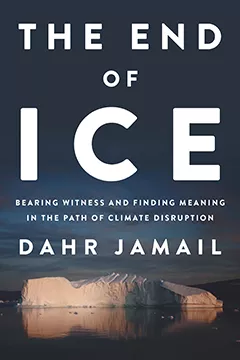In fact, they're pretty dire, author Dahr Jamail writes in his new book The End of Ice: Bearing Witness and Finding Meaning in the Path of Climate Disruption.
Throughout the book, Jamail takes readers from the diminishing glacial ice on Denali — the highest peak in North America — to the coral reefs of the Pacific that are experiencing dire bleaching events and die-offs. He speaks to Alaska Natives about their dwindling subsistence living as seal, bird and fish populations continue to shrink, and learns from scientists how all of the glaciers in Glacier National Park are likely to disappear in just decades.
For years, Jamail worked as a mountain guide and rescue ranger in Alaska. He later jumped into freelance journalism covering the Iraq War's impacts on the Iraqi people over a decade, before becoming a journalist for Truthout, where he continues to work part-time covering environmental issues.
Work on The End of Ice, published in January, started in earnest in 2015, though he says all of his work reporting on environmental issues since 2011 helped inform the book.
The cold, hard truth driven home throughout the text is that a lot of the changes that have started due to human-influenced climate change, which Jamail refers to as climate disruption, are likely irreversible.
"Save some dramatic global coordination, saving things as we know them appears to be a bit of a pipe dream," Jamail tells the Inlander by phone Monday morning, June 10. "Most of the ice is going away outside of the Arctic and parts of Greenland."
Throughout his book, Jamail speaks of his own depression as he realizes the accelerating and irreversible changes to the ice in the mountains where he has spent decades climbing and working. The book ends with a chapter on how hope can get in the way of accepting of what's happening, and he essentially says Earth is going into hospice.
He makes the call to accept that fact, and in effect, start grieving.
But that's not to say he's trying to be a total downer.
"As bleak as that is, the only thing I hoped would happen when I wrote this book is that people would finish reading it and go back to their favorite place to go in nature and reconnect with the planet. I do believe the fundamental cause of the climate crisis is our disconnect from the planet," Jamail says. "If we really get, 'Hey! We are in a crisis!' there’s a lot of emotion that comes with that, but only then can we really start acting accordingly, and I would hope in a way that’s best for the planet."
So more than arguing that people should give up, Jamail says he's trying to issue a sort of reality check and encourage people to deal with that in the best way possible.
"It comes down to how do we want to be during that time?" Jamail says. "My real joy now is found in working alongside other people who are doing important work for the planet."
Jamail currently lives on the Olympic Peninsula, and says as part of his own work to keep his "feet on the ground," he tries to get out into the mountains at least one day a week.
"I'm trying to bridge that on the one hand it looks like we are completely screwed," Jamail says, "but on the other hand, that is a doorway to this opportunity to live more deeply and with greater purpose on the planet."
The author will talk about The End of Ice at 7 pm Wednesday, June 12, at Auntie's Bookstore, 402 W. Main.
The event is being hosted by environmental organizations 350 Spokane and Spokane Riverkeeper.























